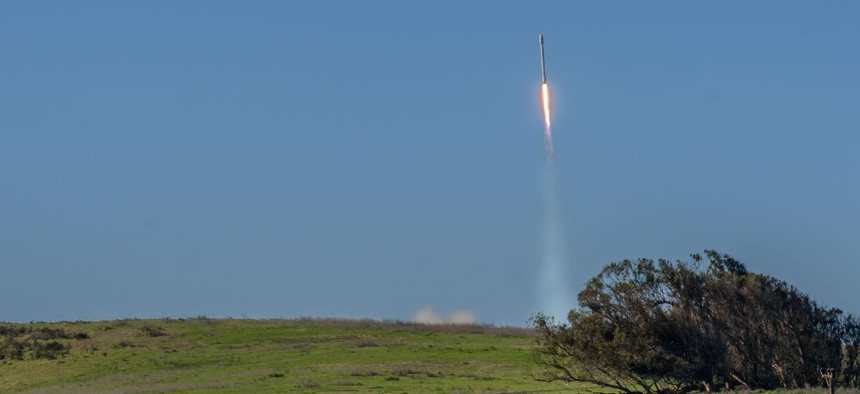California’s Plan to Tax Rockets by the Mile Is Exactly What Space Companies Want

A SpaceX rocket launches from Vandenberg Air Force Base near Lompoc, California. Shutterstock

Connecting state and local government leaders
After 62 miles, the companies are deemed to be in space, and would not incur further taxes.
California has come up with a remarkable plan to tax rocket launches from its coast.
Specifically, their tax payments will be determined by how often they fly the 62 miles (100 km) from a California launchpad to the very edge of space while transporting goods or tourists. After 62 miles, the companies are deemed to be in space, and would not incur further taxes.
The proposal comes as the state’s technology sector ploughs increasing amounts of money into aerospace start-ups, and homegrown company SpaceX asserts itself as the leader in low-cost space access. California is home to highly skilled aerospace engineers and technicians, thanks to the long presence of companies like Boeing and Lockheed Martin, as well as research centers like Caltech’s Jet Propulsion Lab and NASA’s Ames research center.
At the moment, however, the proposed rocket tax will apply mainly to just two companies: SpaceX and United Launch Alliance, the only launch firms that regularly operate in the US. A third California company, Virgin Galactic, intends to fly space tourists in California and launch satellites, but is likely more than a year from commercial operations.
Yet all three companies have backed the new tax rule in meetings with the California government, according to government records and sources familiar with the matter, because the change would clarify their tax status.
In a letter to the California Franchise Tax Board obtained by Quartz, SpaceX CFO Bret Johnsen writes that “without the proposed regulation the standard apportionment rules are unclear as applied to space transportation companies. The proposed regulation provides certainty for us, as well as other taxpayers in the industry, for our California franchise tax filings going forward.”
California tax rules require companies operating there to calculate their taxable revenues based on a number of factors, including what market generates the revenue. But, as regulators note (pdf), “in cases where goods or property are transported into space, it is unclear where the benefit of such services is located.” The complicated new formula, which you you can see in some detail here (pdf), sets a tax rate based on how often rockets are flown from California. It uses the 62-mile trip to space as a standard, and reduces the levy on revenue earned in launches from other sites.
The new rules, based on formulae used for terrestrial transport industries, appear to ensure that a California-based company like SpaceX won’t be excessively taxed for revenue generated by launches in other states, while Colorado-based ULA pays its fair share for using California spaceports.
There is some fear of government overreach at work: The only orbital spaceport in California—that is, the only one where the FAA allows the launch of large payloads into orbit, rather than jaunts to the edge of space—is at Vandenberg Air Force Base, about three hours north of Los Angeles. It’s not as busy as Cape Canaveral in Florida, but it is unique as the only place in the continental US where satellites can be easily launched into a polar orbit, circling the earth north to south.
SpaceX is currently licensed to fly six launches for the satellite company Iridium from Vandenberg, while ULA regularly launches from there, with two more flights expected this year. With the pace of launches expected to increase in the years ahead, US rocket companies that depend on the site did not want to be vulnerable to sudden changes in tax rules. Setting the new formula in stone, one California lobbyist says, will reduce their fear of future hikes.
There is no word yet, however, if SpaceX will also be taxed for the 62 mile space-to-Earth return flight of its reusable rocket boosters.
Tim Fernholz is a Reporter at Quartz, where this article was originally published.

NEXT STORY: How Do State and Local Programs Fare in the Fiscal 2017 Federal Spending Deal?





